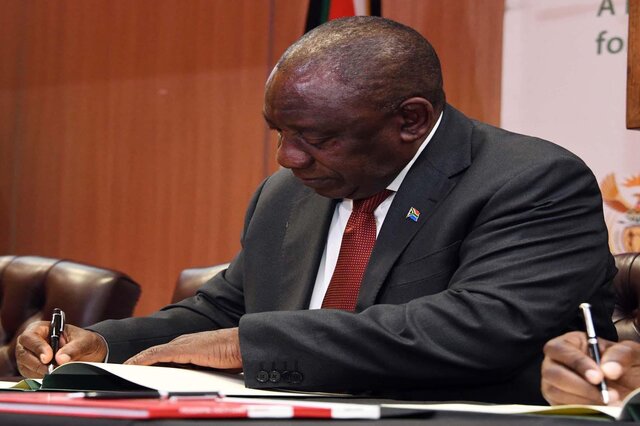Pretoria — President Cyril Ramaphosa signed a disputed education (BELA) Bill into law on Friday but delayed implementation of two clauses that had threatened to fracture South Africa’s nearly three-month-old unity government.
Ramaphosa signed the Basic Education Laws Amendment (BELA) Bill at a public ceremony, despite protests.
The second-largest party in the government, the Democratic Alliance (DA), quickly announced that it was preparing a court challenge.
[WATCH] President Cyril Ramaphosa officially signs the contentious Basic Education Laws Amendment (BELA) Bill into law.#Newzroom405 pic.twitter.com/GllQUdzMw0
— Newzroom Afrika (@Newzroom405) September 13, 2024
It was the first major test of the government of national unity forged after May elections in which the African National Congress (ANC) lost its majority in its worst showing since the first all-race elections of 1994.
Objections from the DA and a handful of smaller parties focus on two clauses that will give the government more power to determine the language and admission policies of schools.
Critics say this will undermine mother-tongue education. The Afrikaans community in particular fears it could penalise schools that teach in its minority language.
“In the spirit of cooperation and meaningful engagement, I have decided to delay the implementation date for clauses 4 and 5 of the bill by three months,” Ramaphosa said.
ANC secretary general Fikile Mbalula says President Cyril Ramaphosa met with four political parties in the GNU to discuss the way forward around the contestation of the BELA Bill being signed into law. He says they all agreed on a three-month period to find a solution.
Watch:… pic.twitter.com/gcw7Dmsc0q
— Newzroom Afrika (@Newzroom405) September 13, 2024
“This will give the parties time to deliberate on these issues and make proposals on how the different views may be accommodated.”
DA leader John Steenhuisen said in a statement that the party’s lawyers were preparing a court challenge. He noted that only about five percent of South Africa’s schools teach in Afrikaans.
“The government should apply itself to improving the vast majority of poorly performing schools that teach through the medium of English, throughout the country,” he said.
However, he has played down fears it would lead the party to exit the government of national unity, saying policy conflicts are “not necessarily an existential threat to the government”.
The DA has instructed its lawyers to continue to prepare for court action on both the process leading to the adoption of the BELA Bill, as well as its substance, on constitutional grounds: https://t.co/fzhTB5fpyf
We note President Ramaphosa’s statement, at the signing ceremony…
— Democratic Alliance (@Our_DA) September 13, 2024
Ramaphosa said he was signing the bill to “give a clear message to the people of South Africa that we are proceeding with the transformation of our education system.”
Other amendments include tightening regulations for home-schooling; penalties to reinforce a ban on corporal punishment; and possible jail terms for parents who do not send their children to school.
The bill will also make compulsory the first level of schooling, which is for children aged four to five.
“The law seeks to ensure uniformity and fairness in educational standards across all schools, and it is only the state that can do so,” Ramaphosa said.
“The signing of this Bill marks an important step towards resolving longstanding challenges in our education system.” Address by President @CyrilRamaphosa at the signing into law of the Basic Education Laws Amendment Bill, Union Buildings, Tshwane https://t.co/0LQieP115S
— The Presidency 🇿🇦 (@PresidencyZA) September 13, 2024
Follow African Insider on Facebook, Twitter and Instagram
Source: AFP
Picture: X/@GovernmentZA
For more African news, visit Africaninsider.com


